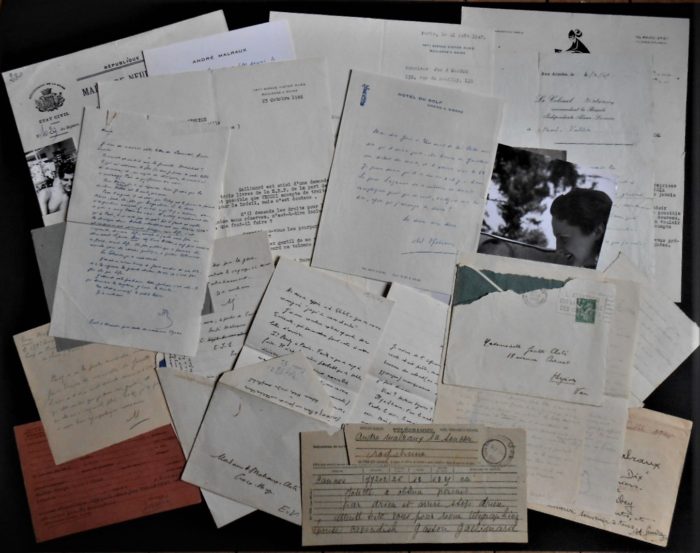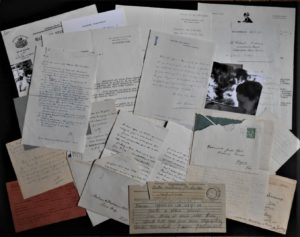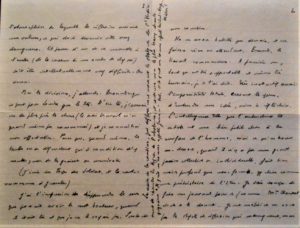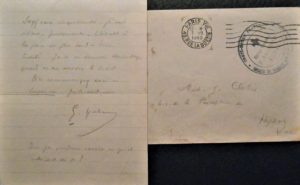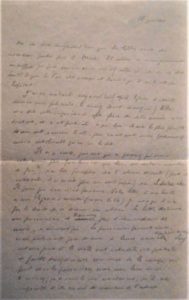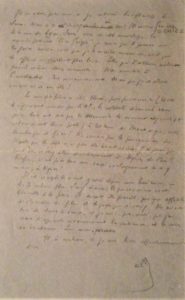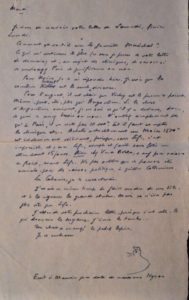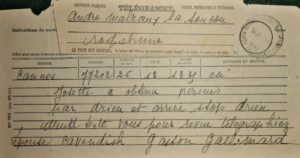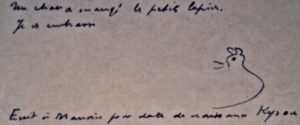André Malraux (1901-1976). Correspondence and documents. 8 autograph letters signed, Provins, Sens and Collemiers, April-October 1940, (7 addressed to Josette Clotis and one to her father, Joseph Clotis, with a correspondence card from Josette addressed to him, Neuilly, 9 November 1940) ; one autograph letter signed, armies, 6 February 1945, to Jeanne Valière; 6 letters signed [2 autograph letters, 3 typed letters and an autograph business card], Paris and Crans-Montana, 1946-1974, to José Santos; one photograph taken at home [?], on 20 November 1975.
With a telegram from Gaston Gallimard, Cannes, 13 December 1940, addressed to him.
As well as 4 documents concerning Josette Clotis and Gauthier Malraux, the eldest son she had with André(a letter signed by the director of Lanvin, Paris, 11 March 1940, to Josette Clotis, a Gauthier’s birth certificate, 13 Octobre 1960, two photos: one in large print of Josette and Gauthier, summer 1941, taken by José Dos Santos, and the other, of identity, of Gauthier adult).
Unique set.
Intimate correspondence, mostly original, between André Malraux and Josette Clotis (Montpellier, 1910 – Saint-Chamant, 1944), woman of letters, French novelist and journalist. Reporter for Marianne, Gallimard published her novels at the NRF where she met André Malraux in 1933 and of which she had 2 children while the writer was married. She died tragically on the platform of the Saint-Chamant station at the end of the war..
Our correspondence between the two lovers begins at the beginning of the conflict, in 1940, at the time of the birth of their son Gauthier, recognized by Roland, brother of André who was not divorced from Clara at the time; note the absence of words of love (Malraux even considering abortion), even if sometimes pierces a great concern about Josette and her son in this troubled period. The author of La Condition humaine evokes his classes during “the funny war”, then, wounded (he says), the surrender of his regiment (without specifying any fight) and his internment in a prison camp.
He addresses The Noyers de l’Altenburg as well as his film adapted from L’Espoir, notes some remarks on Art, insists on his financial difficulties and hopes in his various contracts.
Note the telegram he received from Gaston Gallimard and Drieu la Rochelle : having made Josette obtain a pass for her to join the writer in Cannes, they want his literary collaboration while he is escaped and took refuge in the free zone !
Finally, post-war, Malraux discusses the rights to his works broadcast in Portugal and Brazil.
Except the photograph taken in 1975 on the occasion of an interview for France-Soir, the documents come from the family fund, of Marie-Chantal Dos Santos, the daughter of Suzanne Chantal and José Dos Santos.
Suzanne Chantal (Paris, 1908-1994), was a film critic and editor-in-chief of Cinémonde until 1934, subtitled films, and worked for Gaston Gallimard as editor of the literary weekly Marianne between 1937 and 1939. She was married in 1949 with Portuguese journalist José Augusto Dos Santos, who was a correspondent for several Portuguese dailies and radio stations; the couple was very close to Josette and André Malraux. Suzanne, legatee of Josette’s papers, will pay tribute to her by publishing the couple’s shared biography, Le Cœur battant, Josette Clotis – André Malraux, by Grasset, in 1976, preceded by a letter from the author of La Condition humaine, who expresses to her all his gratitude “of the wreath on the tomb of Charonne”; she was the godmother of their son Gauthier. José Dos Santos, on the other hand, had translated into Portuguese Les Noyers de l’Altenburg, the very first edition of the book that was released in Lisbon in 1943 (S. Chantal, Le Cœur Battant, p. 258).
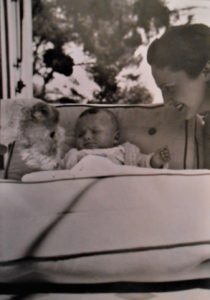
Detailed description on request.
Valuable documents
11 00 €
